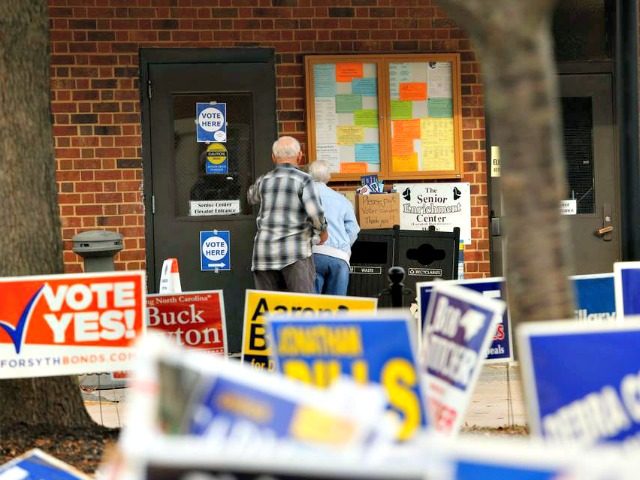WASHINGTON, DC – The Supreme Court upheld states’ ability and obligations under federal law to remove the names of illegal voters from voter rolls prior to Election Day in a case out of Ohio, though election experts caution that the justices’ 5-4 vote highlights the stakes for Republicans’ retaining control of the Senate this November.
“It has been estimated that 24 million voter registrations in the United States—about one in eight—are either invalid or significantly inaccurate,” Justice Samuel Alito began his opinion for the Court. “And about 2.75 million people are said to be registered to vote in more than one State.”
Alito continued:
At issue in today’s case is an Ohio law that aims to keep the State’s voting lists up to date by removing the names of those who have moved out of the district where they are registered. Ohio uses the failure to vote for two years as a rough way of identifying voters who may have moved, and it then sends a preaddressed, postage prepaid card to these individuals asking them to verify that they still reside at the same address. Voters who do not return this card and fail to vote in any election for four more years are presumed to have moved and are removed from the rolls.
The Court’s opinion explained:
For many years, Congress left it up to the States to maintain accurate lists of those eligible to vote in federal elections, but in 1993, with the enactment of the National Voter Registration Act (NVRA), Congress intervened. The NVRA erects a complex superstructure of federal regulation atop state voter-registration systems. The Act has two main objectives: increasing voter registration and removing ineligible persons from the States’ voter registration rolls.
“To achieve the latter goal, the NVRA requires States to conduct a general program that makes a reasonable effort to remove the names of voters who are ineligible by reason of” death or change in residence,” wrote Alito. “When a State receives a return card confirming that a registrant has left the district, the State must remove the voter’s name from the rolls.”
Ohio sends notices to voters the state believes are no longer eligible, such as when the voters have moved out of state. But if there is no response to the confirmation mailing, “the voter’s name is kept on the list for a period covering two general elections for federal office (usually about four years).”
The plaintiffs in this lawsuit sued Ohio, saying that the process of mailing those who are no longer voting, then removing them if they do not respond and continue not to vote, violates part of the NVRA providing that voters shall not be removed solely for lack of voting activity.
The Court majority would have none of it. “Not only are States allowed to remove registrants who satisfy these requirements, but federal law makes this removal mandatory,” Alito explained.
“We reject this argument because the Failure-to-Vote Clause, both as originally enacted in the NVRA and as amended by HAVA, simply forbids the use of nonvoting as the sole criterion for removing a registrant, and Ohio does not use it that way,” he continued. “Instead, as permitted by subsection (d), Ohio removes registrants only if they have failed to vote and have failed to respond to a notice.”
Alito’s opinion was joined by the other conservative justices plus moderate Justice Anthony Kennedy.
Justice Clarence Thomas joined Alito’s opinion, but also wrote separately to add that the challengers’ argument “should also be rejected because it would raise significant constitutional concerns.” He reasoned that constitutional text and history both “confirm that States have the exclusive authority to set voter qualifications and to determine whether those qualifications are satisfied.”
He began with the Constitution’s Qualifications Clause:
States thus retain the authority to decide the qualifications to vote in federal elections, limited only by the requirement that they not establish special requirements for congressional elections. And because the power to establish requirements would mean little without the ability to enforce them, the Voter Qualifications Clause also “gives States the authority . . . to verify whether [their] qualifications are satisfied.
Thomas then turned to the Constitution’s Elections Clause.
“But, as originally understood, the Times, Places and Manner Clause grants Congress power only over the when, where, and how of holding congressional elections,” not over the question of who can vote,” he concluded.
Secretary Ken Blackwell is one of the nation’s foremost authorities on this issue, having served as the chief elections officer in Ohio as secretary of state, protecting voting rights as the U.S. ambassador to the United Nations Human Rights Commission, serving as a domestic policy adviser on President Trump’s transition team, and most recently as a commissioner on the Presidential Commission on Election Integrity.
“The Court’s decision is a great victory for protecting the integrity of the ballot box, both in my home state of Ohio and across America,” Blackwell told Breitbart News in an exclusive interview. “Under the Constitution, states have primacy in America’s electoral system.”
“Every illegal vote cancels out some law-abiding citizen’s legal vote, and Congress enacted this statute in part to safeguard the integrity of the ballot box.” Blackwell continued. “The fact that this was a 5-4 decision, shows how important the 2018 elections are, because electing more conservative Republicans to the Senate is essential to President Trump having the opportunity to appoint constitutionalist judges who will protect our rights and uphold the rule of law.”
The case is Husted v. A. Philip Randolph Institute, No. 16-980 in the Supreme Court of the United States.
Ken Klukowski is senior legal editor for Breitbart News. Follow him on Twitter @kenklukowski.

COMMENTS
Please let us know if you're having issues with commenting.